18 citations,
January 1994 in “Skin pharmacology and physiology” Sunlight damages hair, causing cuticle loss, protein changes, and discoloration.
 17 citations,
July 2018 in “International Journal of Cosmetic Science”
17 citations,
July 2018 in “International Journal of Cosmetic Science” Keratin-based particles safely improve hair strength, smoothness, and heat protection.
 17 citations,
January 2003 in “Skinmed”
17 citations,
January 2003 in “Skinmed” Athletes can experience various skin injuries from physical activity and environmental factors, and performance-enhancing drugs can also negatively affect their skin.
 13 citations,
January 2017 in “Cosmetics”
13 citations,
January 2017 in “Cosmetics” Different tests are used to see how hair care products affect hair, and choosing the right test is important for accurate results.
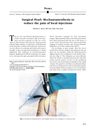 13 citations,
April 2001 in “Journal of The American Academy of Dermatology”
13 citations,
April 2001 in “Journal of The American Academy of Dermatology” Using a vibrating device during injections can help reduce pain.
 13 citations,
January 1995 in “Postgraduate medicine”
13 citations,
January 1995 in “Postgraduate medicine” Excessive hair growth in women can be harmless or signal serious health issues, and treatment often includes medication and hair removal, with noticeable results after 3-6 months.
12 citations,
October 2018 in “Biotechnology reports” Recombinant keratin K31 makes damaged hair thicker, stronger, and straighter.
 12 citations,
January 2007 in “Current problems in dermatology”
12 citations,
January 2007 in “Current problems in dermatology” Environmental and cosmetic factors, including heat, chemicals, and sun exposure, can cause hair loss and damage.
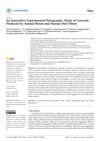 11 citations,
July 2021 in “Sustainability”
11 citations,
July 2021 in “Sustainability” Concrete made from animal bones and human hair is stronger and more environmentally friendly than traditional concrete.
11 citations,
April 2016 in “PubMed” New imaging and testing methods can effectively assess hair shape changes and damage.
 11 citations,
February 2008 in “British journal of nursing”
11 citations,
February 2008 in “British journal of nursing” Idiopathic hirsutism causes excessive hair growth in women, can be treated with medication and hair removal, but cannot be fully reversed.
 11 citations,
August 2003 in “Plastic and Reconstructive Surgery”
11 citations,
August 2003 in “Plastic and Reconstructive Surgery” Hair restoration in children, tailored to their specific needs, can yield good aesthetic results with minimal complications.
 11 citations,
May 2003 in “Obstetrics and gynecology (New York. 1953. Online)/Obstetrics and gynecology”
11 citations,
May 2003 in “Obstetrics and gynecology (New York. 1953. Online)/Obstetrics and gynecology” Hirsutism in women often indicates a hormonal imbalance and can be managed with a combination of hormonal treatments and hair removal methods.
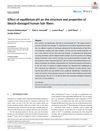 10 citations,
September 2020 in “Biopolymers”
10 citations,
September 2020 in “Biopolymers” Hair's structure and properties change with pH; acidic pH maintains strength and less swelling, while alkaline pH increases water content and swelling.
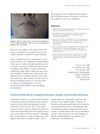 9 citations,
November 2013 in “Dermatologic Surgery”
9 citations,
November 2013 in “Dermatologic Surgery” Hair transplant complications were likely due to deep graft placement and rough handling.
7 citations,
October 2019 in “Frontiers in bioengineering and biotechnology” Fusion proteins can protect hair from heat damage.
 7 citations,
June 2019 in “Australasian Journal of Dermatology”
7 citations,
June 2019 in “Australasian Journal of Dermatology” Elderly men with a scalp condition healed in about 26 days using specific creams and dressings, with no return of the condition in 6 months.
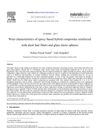 7 citations,
January 2018 in “Materials Today: Proceedings”
7 citations,
January 2018 in “Materials Today: Proceedings” Adding human hair fibers and glass micro-spheres to epoxy improves its wear resistance and strength.
 7 citations,
July 2008 in “Experimental Dermatology”
7 citations,
July 2008 in “Experimental Dermatology” The study concluded that a protein important for hair strength is regulated by certain molecular processes and is affected by growth phases.
 7 citations,
May 1978 in “International Journal of Dermatology”
7 citations,
May 1978 in “International Journal of Dermatology” Recent hair loss research shows some progress, especially in understanding male pattern baldness, but effective treatments for many types of hair loss are still lacking.
 6 citations,
August 2023 in “Fertility and Sterility”
6 citations,
August 2023 in “Fertility and Sterility” The 2023 guideline for PCOS suggests using updated diagnostic criteria, assessing related health risks, and recommends lifestyle changes and specific treatments for symptoms and fertility issues.
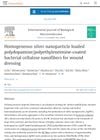 5 citations,
July 2023 in “International journal of biological macromolecules”
5 citations,
July 2023 in “International journal of biological macromolecules” The new wound dressing material speeds up healing, fights infection, and outperforms traditional dressings.
 4 citations,
July 2022 in “International Journal of Cosmetic Science”
4 citations,
July 2022 in “International Journal of Cosmetic Science” Hair moisture behavior helps tell apart different chemical treatments and reveals insights into hair structure.
 3 citations,
September 2019 in “Journal of Orthodontics”
3 citations,
September 2019 in “Journal of Orthodontics” A boy's hair grew back after he stopped using orthodontic headgear that caused temporary hair loss.
 3 citations,
July 2019 in “Journal of Cosmetic Dermatology”
3 citations,
July 2019 in “Journal of Cosmetic Dermatology” New shampoo with tyramine hydrochloride reduces hair loss by making a small muscle in the hair follicle contract.
 3 citations,
January 2011 in “Female pelvic medicine & reconstructive surgery”
3 citations,
January 2011 in “Female pelvic medicine & reconstructive surgery” Hormones significantly affect women's sexual function, and more research is needed to improve treatments for sexual dysfunction with minimal side effects.
 2 citations,
January 2017 in “Folia biologica”
2 citations,
January 2017 in “Folia biologica” The KRTAP7-1 gene is very similar across different cattle and yak breeds and likely plays a role in hair strength and shape.
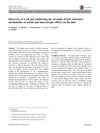 2 citations,
February 2016 in “Journal of sol-gel science and technology”
2 citations,
February 2016 in “Journal of sol-gel science and technology” A small molecule can strengthen fine hair, making it more resistant and natural-feeling.
 2 citations,
January 2012 in “Journal of metabolic syndrome”
2 citations,
January 2012 in “Journal of metabolic syndrome” The document concludes that hirsutism can be managed with various treatments tailored to the individual, potentially improving quality of life.
 2 citations,
January 2002 in “PubMed”
2 citations,
January 2002 in “PubMed” The new test shows how hair treatments affect hair's bending stiffness by swinging a pendulum through hair fibers.

























